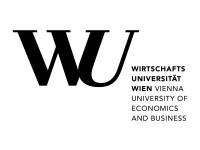Das Projekt
Die Vertreibung von Dozenten und Verwaltungsangestellten durch das NS-Regime ist nach dem Zweiten Weltkrieg gelegentlich in Festschriften der Hochschule für Welthandel sowie in wissenschaftlichen Publikationen thematisiert worden. Im November 2012 begannen intensive Recherchen zu den Studierenden. Ihre Namen und ihr Schicksal machen den größten Teil dieses Gedenkbuchs und eines Mahnmals aus, das am 1. Mai 2014 auf dem Campus der Wirtschaftsuniversität Wien, der Nachfolgerin der Hochschule für Welthandel, feierlich eingeweiht wurde. Ausgangspunkt für die Recherchen waren Unterlagen des Archivs und der Studienabteilung der Wirtschaftsuniversität Wien. Dazu kamen weitere Archive sowie Internetdatenbanken, die als zuverlässige Quellen zu Verfolgten des NS-Regimes anerkannt sind. Zu etlichen Persönlichkeiten sind leider nur wenige Dokumente und Informationen überliefert. Insbesondere die Vernichtung von Akten oder der Verlust von zeitgenössischen Quellen in Folge von Kriegsereignissen haben den Nachforschungen materielle Grenzen auferlegt. Angesichts der vielen Jahrzehnte, die zwischen dem ‚Anschluss Österreichs‘ und dem Projekt liegen, war es nur in wenigen Fällen möglich, mit Zeitzeugen Interviews zu führen.
Wer findet Aufnahme in dieses virtuelle Gedenkbuch und auf das Mahnmal? Neben den Dozenten und Verwaltungsangestellten, die zwischen 1938 und 1945 von der ehemaligen Hochschule für Welthandel ‚gesäubert‘ wurden, finden sich biographische Kurzeinträge zu den Studierenden, die nachweislich aus ‚rassischen‘, politischen oder weltanschaulichen Gründen am Studium, an der Ablegung von Prüfungen oder an der Promotion gehindert wurden, wie sie die Studien- und Prüfungsordnung bzw. die Promotionsordnung vorsahen. Zu den Opfern von Verfolgungs- und Repressionsmaßnahmen des NS-Regimes gehören die ordentlichen und außerordentlichen Hörerinnen und Hörer des Diplomstudiengangs ebenso wie diejenigen, die ein Doktorat der Handelswissenschaften anstrebten. Auch jene Absolventinnen und Absolventen, denen ein an der Hochschule für Welthandel erworbener akademischer Grad aberkannt wurde, stellen Verfolgungsopfer des ‚Dritten Reiches‘ dar. Alle diese Menschen wurden an der Entfaltung ihrer persönlichen und beruflichen Fähigkeiten gehindert, einige ehemalige Studierende der Hochschule für Welthandel sind in der Shoah oder durch Kriegseinwirkung ums Leben gekommen.
Hingegen werden nur in belegbaren Einzelfällen Personen als Opfer der nationalsozialistischen ‚Säuberungen‘ berücksichtigt, die
- ihr Studium nach dem ‚Anschluss‘ Österreichs an einer anderen Hochschule des ‚Großdeutschen Reiches‘ fortgesetzt haben;
- bis zum 8. Mai 1945 ihr Studium an der Hochschule für Welthandel oder einer anderen Hochschuleinrichtung des ‚Großdeutschen Reiches‘ abschließen konnten;
- schon längere Zeit vor dem ‚Anschluss‘ Österreichs nicht mehr an Lehrveranstaltungen der Hochschule für Welthandel teilgenommen oder Prüfungen abgelegt haben;
- als Religionsbekenntnis „gottgläubig“ angegeben und damit in der ideologisch verschleierten Diktion des ‚Dritten Reiches‘ eine Nähe zum NS-Regime zu erkennen gegeben haben;
- allgemein verordneten Verpflichtungen unterlagen wie Wehrdienst, Arbeitsdienst oder studentischem Ausgleichsdienst, den die Reichsstudentenführung als eine Art von Bewährungsprobe für den Zugang zum Studium und für Stipendien jenen Studierenden auferlegen konnte, die als untauglich für den Wehrdienst galten.
Ausgeschlossen vom Gedenkbuch sind Personen, die
- der NSDAP oder der SS angehörten;
- eine Offiziersausbildung bei bewaffneten Verbänden des NS-Staates aufgenommen haben.
Auch Studierende aus Ländern, die im Zuge des Zweiten Weltkriegs vom Großdeutschen Reich als „Feindstaaten“ identifiziert und vom weiteren Studium ausgeschlossen wurden, werden in der Regel nicht ins Gedenkbuch aufgenommen, weil diese Praxis nicht Ausdruck genuin nationalsozialistischer Politik gewesen ist und auch von anderen kriegsführenden Staaten angewendet wurde.
Angaben zur Staatsbürgerschaft und geografische Bezeichnungen werden aus den Quellen übernommen, sie spiegeln somit die zeitgenössische Situation wider. Dies hat folgende Konsequenzen:
- Es kann sein, dass eine bestimmte Stadt einem anderen Land zugewiesen wird, als dies dem heutigen Stand entspricht. So wird beispielsweise Lemberg mit Blick auf das Jahr 1938 nicht als eine Stadt in der Ukraine, sondern als eine polnische Stadt angegeben.
- Findet sich in den Karteikarten der Wirtschaftsuniversität Wien die Angabe einer „deutsch-österreichischen“ Staatsbürgerschaft, wird diese Bezeichnung übernommen.
- Finden sich auf Karteikarten der Wirtschaftsuniversität Wien mehrere Staatsbürgerschaften wie Österreich, Deutsches Reich und/oder Ostmark, werden alle Angaben in der Datenbank wiedergegeben. Zu beachten ist in diesem Zusammenhang, dass die österreichische Staatsbürgerschaft durch eine Verordnung des Reichsinnenministers vom 3. Juli 1938 ihre Gültigkeit verlor; seitdem wurde nur noch die deutsche Staatsangehörigkeit anerkannt.
In der Regel enthält das Gedenkbuch die Biogramme ausschließlich in deutscher Sprache. Für eine Übersetzung in eine andere Sprache wird empfohlen, (Online-)Wörterbücher, virtuelle Übersetzungstools wie Deepl oder Google Übersetzer oder Künstliche Intelligenz zu verwenden.
Für Ergänzungen steht die Rubrik Kontakt zur Verfügung.
Das Gedenkprojekt wurde zunächst gefördert vom Rektorat der Wirtschaftsuniversität Wien. Es wurde unterstützt vom Zukunftsfonds der Republik Österreich und vom Nationalfonds der Republik Österreich für Opfer des Nationalsozialismus. Seit dem Ende der Anschubfinanzierung übernimmt das Institut für Wirtschafts- und Sozialgeschichte der WU Wien die Kosten für das Hosting der Datenbank.
Als Teil der Forschungsgruppe SABE (Studying Antisemitism in Business and Economy) der WU Wien wurde das Gedenkprojekt für den Simon-Wiesenthal-Preis 2024 nominiert. Eine Aufzeichnung von der Preisverleihung vom 18. September 2025 findet sich hier.
Redaktion
Univ.-Prof. Dr. Peter Berger (bis 2015)





